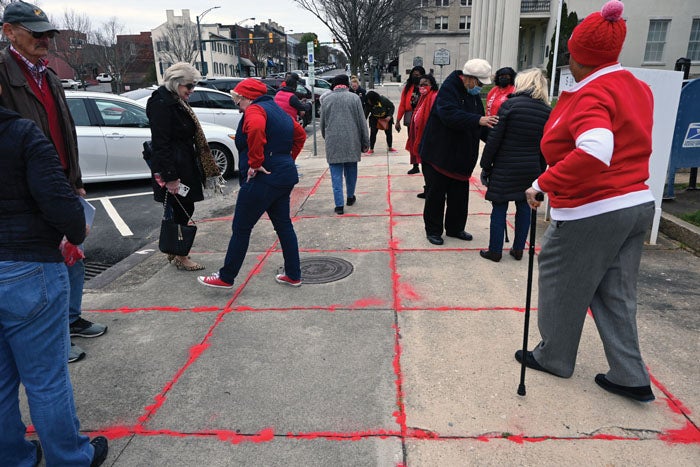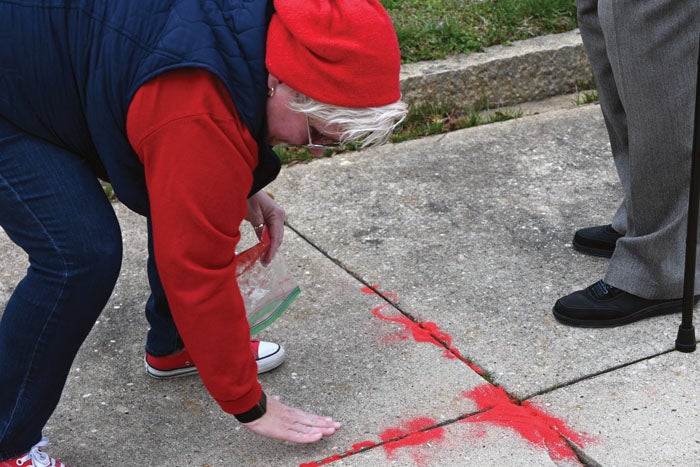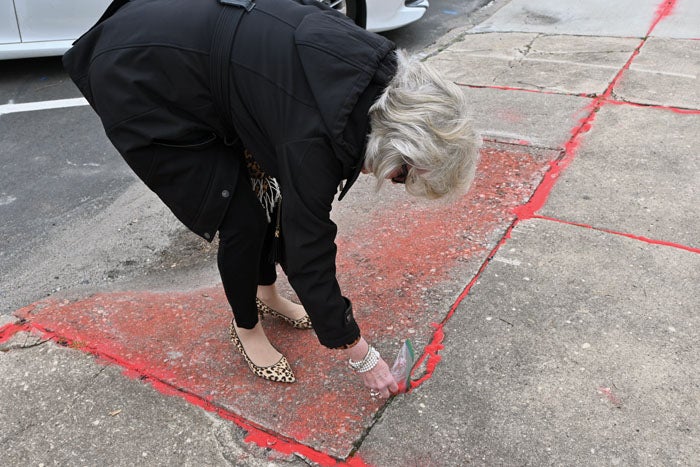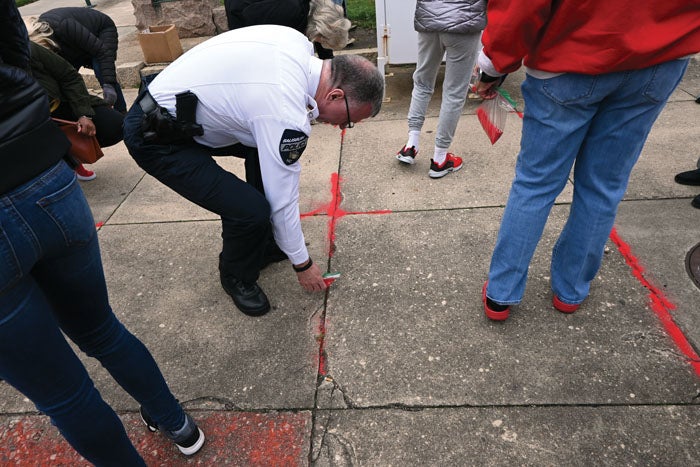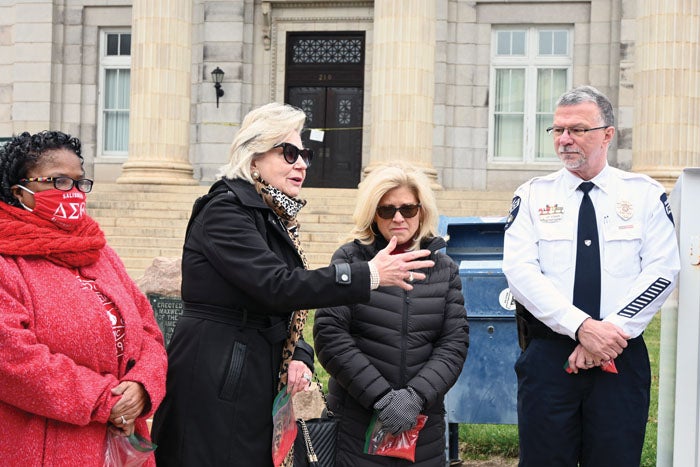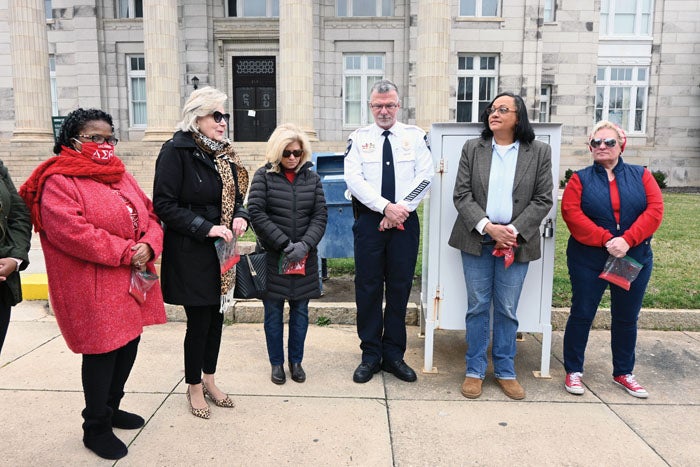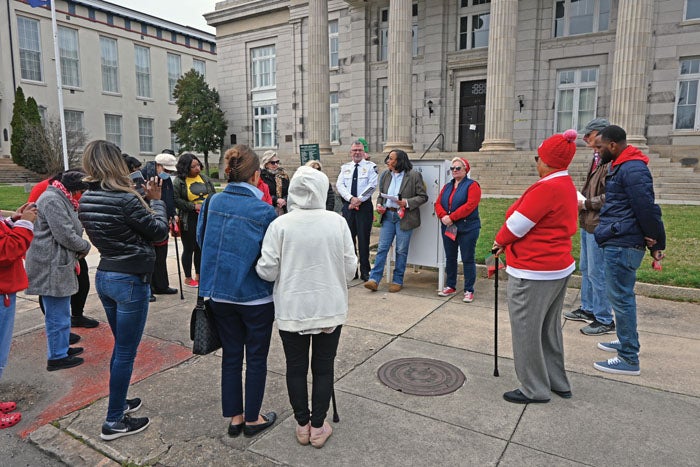Event creates courthouse display for human trafficking victims who have ‘fallen through the cracks’
Published 12:05 am Sunday, February 27, 2022
SALISBURY — People walking near the Rowan County Courthouse this week may see lines of red sand on the cracks of the sidewalk.
The red sand represents people who have “fallen through the cracks” as victims of human trafficking.
Human trafficking, also referred to as modern-day slavery, occurs when a person is compelled or coerced into providing labor or services or exploited for commercial sex acts. Victims can be anyone. While there are no defining characteristics all victims share, traffickers around the world often target those who are poor, vulnerable, living in an unsafe or unstable condition or in search of a better life.
The red sand, placed in front of the courthouse Saturday, is part of the national Red Sand Project, started by Molly Gochman in 2014. Globally, an estimated 40.3 million live in slavery, which can include forced marriages, forced labor or sexual exploitation. Gochman began the project in Miami and filled the sidewalks in and around Art Basel Miami Beach with red sand. The grains represent people who fall through the cracks of social, economic and political systems or because of a lack of awareness.
The Salisbury Police Department got involved with the initiative a couple years ago when Alberta McLaughlin joined SPD as the victim and witness advocate. For the second consecutive year, a program was held via Zoom Saturday. Presentations were made by Catherine Rivens, chair of the International Awareness and Involvement Committee of the Salisbury alumnae chapter of Delta Sigma Theta Sorority, Michael Phillips of the North Carolina State Bureau of Investigation, Jim Duncan of Project Light and Statesville attorney Daryl G. Davidson Sr.
Shortly after the Zoom presentation, attendees gathered at the Rowan County Courthouse Saturday afternoon to participate in the symbolic pouring of sand. The project also provided participants with toolkits with packets of red sand and information about slavery and trafficking in the U.S. and across the world. The project’s impact spans all 50 states and 70 countries, with more than 1 million participants, according to the Red Sand Project website.
Members from SPD, NAACP, the Tau Alpha chapter of Omega Psi Phi and Delta Sigma Theta Sorority also set up at the Square downtown to pass out information and red sand packets to local residents. Though symbolic, it can spark conversations within neighborhoods and spread awareness, Duncan said.
“No doubt, you and I know someone who has been human trafficked and we want to stop it. That is our goal,” Rivens said. “And I think we’ve united as groups to stop human trafficking.”
More than half of trafficking victims are children. Duncan said girls around the age of 10-12 are often the primary targets. Traffickers can easily target girls on social media, preying on those with insecurities. Duncan said increased awareness is critical to prevent human trafficking.
“They are being raped. The ones that are in labor, they’re being forced into things they don’t want to do,” he said.
Duncan said the nonprofit, volunteer-led organization Project Light, which stands for “Let’s Interrupt Growing Human Trafficking,” is now in its second year. A $5,000 grant from Duke Energy will help Project Light increase its supply of awareness materials and training for the community, local schools, law enforcement agencies and hospitals.
Mayor Karen Alexander said awareness is the first step. And while it’s a “tragedy to even have to deal with it,” she’s encouraged by the work being put in by community members to stop the ruining of lives.
“It’s so thrilling to me that our community members are always the hands and feet of Jesus in terms of reaching out to the most vulnerable and lifting up those for the general public to know what they’re going through,” Alexander said. “A lot of us are living in bubbles and we don’t know how much suffering is happening.”
Family Crisis Council, a nonprofit led by Renee Bradshaw, works to shelter, support and advocate for victims of rape, sexual assault, incest and domestic violence. Bradshaw said the shelter has 24 beds and works alongside law enforcement agencies to swiftly get victims into the shelter and to treatment. Time is of the essence because traffickers are almost certainly looking for their victims if they are nearby.
“We need to get (victims) in, get them out and get them where they need to be to get the help to change their lives,” Bradshaw said.
Mayor Pro Tem Tamara Sheffield said victims are often blamed for not seeking help or walking away when they had a chance. But saving one victim can help them save a larger network of victims, she said.
“It’s because they have actually fallen through the cracks and they don’t know that help is here,” Sheffield said. “So awareness — as cliche sometimes as it feels and sometimes as futile as it feels — is the key to us bringing these people to their own realizations that they can get out.”
The following are some warning signs someone may be a victim of human trafficking:
• appearing malnourished
• showing signs of physical injuries and abuse
• avoiding eye contact and social interaction with authority figures and law enforcement
• seeming to adhere to scripted or rehearsed responses in social interactions
• lacking official identification documents
• appearing destitute/lacking personal possessions
• working excessively long hours
• living at place of employment
• checking into hotels/motels with older adults, particularly men, and referring to them as “boyfriend,” “daddy” or other slang terms
• poor physical or dental health
• tattoos/branding on the neck and/or lower back
• untreated sexually transmitted infections
• small children serving in family restaurant
• security measures that appear to keep people inside an establishment
• the prevention of being able to be in public alone or speak for themselves
To learn more, contact the National Human Trafficking hotline at 1-888-373-7888 or text 233-733 (be free).


